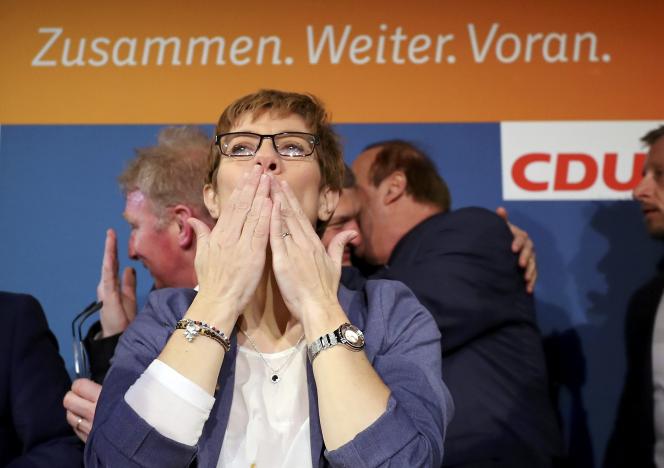German Chancellor Angela Merkel’s conservatives won a regional election in the western state of Saarland on Sunday, in a surprise state poll triumph, as the hype around her main rival fizzled on its first test in a “super election year”.
With just six months to go until a general election in Europe’s top economy, the poll in the tiny southwestern state of Saarland Sunday took on outsized importance. The victory dealt a setback to the rival Social Democrat (SPD) and boosting Merkel’s prospects of winning a fourth term in September’s national election.
Merkel’s Christian Democrats (CDU) strengthened their position as the largest party in the state despite expectations ahead of the vote that the SPD would be boosted by their new national leader, Martin Schulz.
The CDU won 40.7 percent of the vote, up from 35.2 percent in the previous election in Saarland in 2012, preliminary official figures showed. The SPD slipped to 29.6 percent, down from 30.6 percent.
Prior to the election, polls had indicated that a left-leaning “red-red-green” alliance of the SPD, the far-left Linke and the environmentalist Greens — or even a “red-red” coalition if the Greens failed to win enough votes — could emerge after the vote. But the Greens failed to reach the 5 percent threshold required to enter the state assembly, while the SPD and Linke, which won 12.9 percent, lacked enough votes to form a coalition on their own.
“The people decided on stability and reliability,” CDU Secretary General Peter Tauber said. “This result is a clear rejection of red-red-green.”
Schulz, the former president of the European Parliament, admitted Monday that the result had been a bitter disappointment just a week after SPD delegates unanimously elected him party chairman.
But he tried to put a brave face on the defeat.
“This is a long-distance run, not a sprint,” Schulz said with an eye on September’s national election, but added that the outcome of Sunday’s vote should not be “sugar-coated”. Schulz is trying to win over dissatisfied working class voters with a message of social justice.
Saarland has only 800,000 eligible voters, but the state election was the first of three regional votes ahead of the September 24 federal vote and offered an opportunity for the parties to build, or lose, momentum for the national election.
After weeks of breathless media coverage of the so-called “Schulz effect”, credited with lifting the SPD around 10 points in national polls to pull even with the CDU, news website Spiegel Online said the election proved he had “no magic powers”.
“This much is clear after the CDU success in Saarland: the SPD had better get ready for a tough campaign,” it said.
The center-left Sueddeutsche newspaper said the poll had been a crushing reality check for the SPD.
“While yesterday’s result hasn’t ended the SPD’s hopes of making it into the chancellery, it has certainly put a damper on Schulz mania,” it said.
Germany’s top-selling daily Bild said Merkel clearly had the wind in her sails after the Saarland vote, noting the dilemma faced by Schulz and the SPD.
“It’s a small state, but a big signal,” it said of Saarland, the first of three German state polls scheduled in the run-up to the national election.
“If Martin Schulz wants to become chancellor, he is going to have to put all his eggs in the Red-Red-Green basket –- a big risk. And Angela Merkel can breathe a sigh of relief and get ready for the next Schulz attack.”
Merkel has been an anchor of stability in Europe, which she has guided through the euro zone and migrant crises during her 11-year leadership, at a time when many voters are unnerved by rising populism.
The far-right Alternative for Germany (AfD), which bruised Merkel in regional elections last year after her decision in 2015 to open Germany’s doors to migrants from the Middle East, won 6.2 percent of the vote in Saarland.
